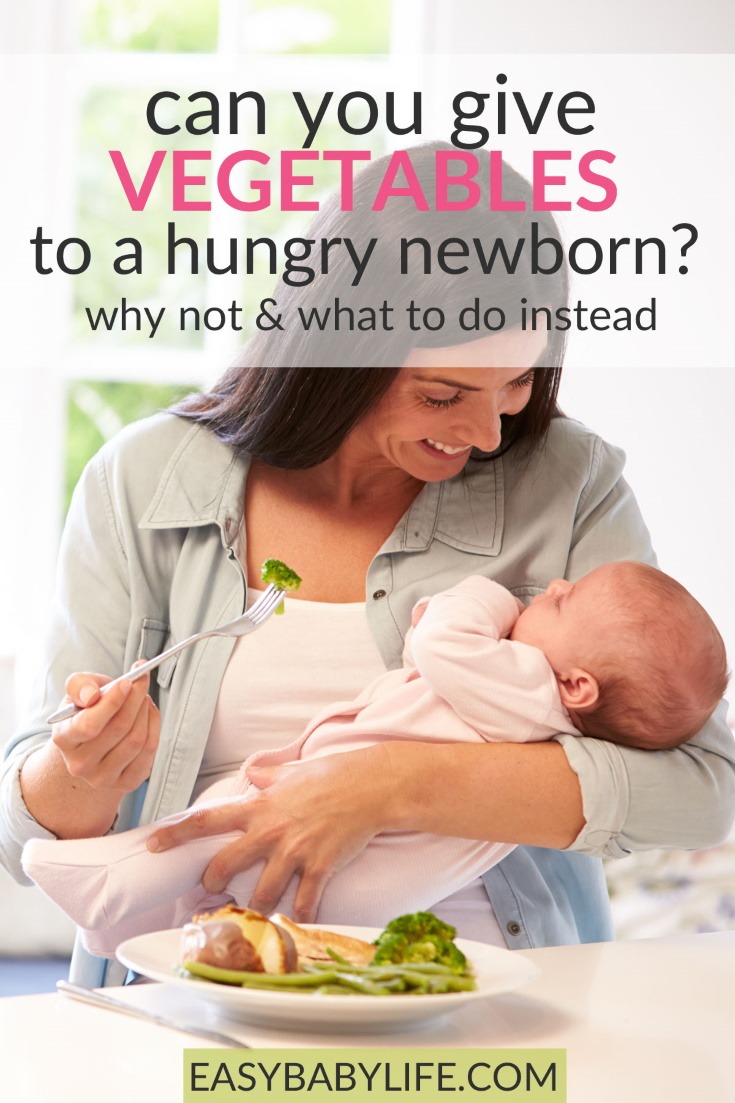Mom’s Question:
Is it bad to give some vegetables to a newborn baby – like carrots mixed with baby formula so he can get full? My 1-month-old baby is not getting full on just formula only. He eats almost every hour and a half to two hours and he eats about 3 ounces.
Baby Helpline:
Vegetables To Hungry 1-Month-Old – Yes Or No?
Thank you for asking this question! Many parents have hungry newborn babies and try to find creative ways to make them full. Having a 1-month-old baby is exhausting for many reasons; they don’t sleep for long hours, they cry a lot and they want to eat all the time. It is probably quite exhausting to be 1-month-old too..!
However, mixing the formula with anything – vegetables, rice cereal or anything else – to keep the baby satisfied is not a good solution for several reasons.
Health risks from early introduction of solid foods
First of all, a one-month-old baby is way too young to digest carrots or any other vegetable (or even rice cereal). He is very likely to become constipated and get tummy pain from it.
In addition, several studies indicate more or less severe health risks from early introduction of any kind of solid foods to infants. For example, the baby might be at risk of infections, undernutrition, and death in the short term and increased risk of obesity, heart disease and diabetes in the long term. Not something you want to expose your baby to, right!
Also, a number of studies show that the early introduction of solids in babies is associated with allergic diseases, including eczema and wheezing.
One of the reasons why there is an allergy risk from too early food introduction is that before the age of four months, the digestive tract of a baby is immature and also porous. This means that foreign proteins in allergy-producing foods are easily absorbed from the intestine into the blood.
Young infants also have not yet developed the right gut bacteria to process solid food safely, potentially leading to gastroenteritis and diarrhea.
And some risks…
There is also a choking risk. The oral muscles of a child younger than four months are not suitable for solid foods and there is often a problem with the coordination of swallowing, increasing the chances of choking. This coordination and swallowing difficulties can actually exist also after 6 months for some babies.
Also, 1 month or even 2 or 3 months of age, babies can’t even hold their heads up properly and definitely not sit, so feeding solids is difficult and maybe even dangerous for that reason too.
So, how to help a hungry baby
By now, hopefully, I have given you enough reasons to NOT give vegetables to your baby – or any other solid foods for that matter. The problem of course still remains – your baby is hungry!
Now, to put things in perspective – have a look at your baby’s hand. His fist size is the same as the size of his stomach. He can’t eat very much without getting full. At the same time, babies grow incredibly quickly during their first 3 months of living, so to develop properly they really need to eat frequently.
So, the reason that your baby wants to eat all the time is that he is healthy, thriving, and growing! AND has a very tiny tummy! :-)
Breast milk and formula are optimized to give the baby the best possible nutrition to thrive. Anything else is less beneficial for the baby in the beginning. Don’t be tempted to add something filling to it, because it will be bad for your baby!
I know it can be very tough in the beginning with a baby that doesn’t get full and wants to eat all the time, but it is normal and it passes. Try to endure!
Here are two links to tips to help you as a new mom sleep better and how to organize the bottle-feeding at night to make it as simple as possible:
Hang in there!
Paula
Research on early introduction of solid foods and infant health
- Food allergy and the introduction of solid foods to infants: a consensus document. Adverse Reactions to Foods
- Infant Feeding and Risk of Type 1 Diabetes in Two Large Scandinavian Birth Cohorts
- Infant Exposures and Development of Type 1 Diabetes Mellitus
Find comments below.
Comments for “Baby Not Getting Full on Formula – Can I Offer Vegetables?” |
||
|
||
|
||
| We have changed to a new commenting system. Add your comments below or return to Breastfeeding & Formula Q&A. |

Paula Dennholt founded Easy Baby Life in 2006 and has been a passionate parenting and pregnancy writer since then. Her parenting approach and writing are based on studies in cognitive-behavioral models and therapy for children and her experience as a mother and stepmother. Life as a parent has convinced her of how crucial it is to put relationships before rules. She strongly believes in positive parenting and a science-based approach.
Paula cooperates with a team of pediatricians who assist in reviewing and writing articles.






Hello,
It can be tough when a young baby wants to eat frequently but as already mentioned their stomachs are small so they need to eat frequently. This will slow down between 3 and 4 months.
HOWEVER, giving an infant as young as your child (any infant under 4 months old) foods of any kind (including grains) can be very risky. The reason is that an infant at this age has not yet developed the ability to break down complex foods and sugars. When you give them something like carrots or even rice you run the risk of causing many problems, ranging from upset stomach, constipation, diarrhea, painful gas, to blood sugar issues that may stick with them through life.
At worst you could cause mild to moderate hypoglycemia (low blood sugar) because their bodies are pushed into producing more insulin than they need, because of the complex sugars in foods. The result of this would be that your son would feel even more hungry because of the body’s reaction to the low blood sugar (the same feeling that you get when you go all day without eating, shaky and very very hungry)
Basically giving complex foods (anything other than breast milk or formula) to a young infant can lead to many problems.
One last thing, if you are using formula check the number on the can. There are generally 3 levels and if you are not using the youngest level your baby may not be getting as many calories as he needs to feel full.
The first level is the most calorie-rich (best for young babies till 3 months) and they become less rich from there. If you are breastfeeding check with your doctor to be sure that YOUR diet is the best for making breast milk (sometimes we forget that even after we have the baby we are still “eating for two”)
Good luck
Start out with baby cereal. Never veggies… Rice cereal is best to start out with adding a little dry cereal to his formula. Just a little. Worked with all three of mine. Good luck